Can you air fry taco meat? Yes indeed! You can brown meat in an air fryer, and the process is more hands off than using a skillet. This air fryer ground beef recipe cooks in only 5 minutes! Use your air fryer taco meat to make the best taco bowls, or try it in air fryer ground beef tacos. You’ll love how quick, easy, and versatile making air fried beef mince is.
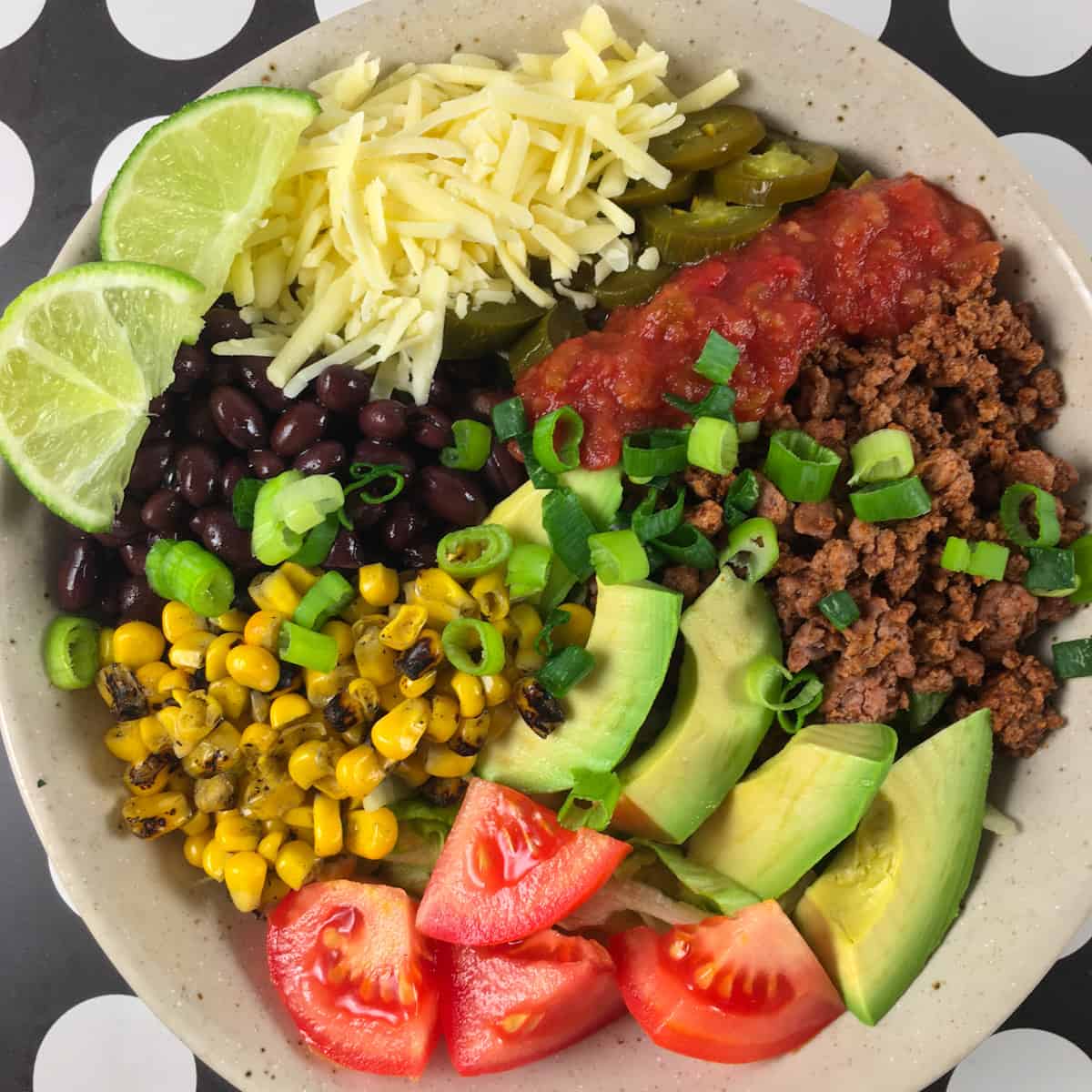
Want to save this post?
Enter your email below and we'll send it straight to your inbox. Plus you'll get great new recipes from us every week!
Getting bored of burgers but have some lean ground beef (AKA beef mince) on hand? Let’s make air fryer taco beef! It’s packed with protein and is perfect for making beef and black bean taco bowls.
I’m going to give you a recipe for a homemade taco seasoning mix. It’s a lower sodium option than what’s in most taco seasoning packets from the store. That said, you’re welcome to use a store-bought pack of taco seasoning if you need that shortcut.
Table of Contents
⭐ How to Make Air Fryer Taco Meat
You only need two ingredients to make air fryer taco meat (no cooking spray is needed!):
- 1 lb lean ground beef (454 grams; I used 90/10 ground beef)
- 5 teaspoons taco seasoning
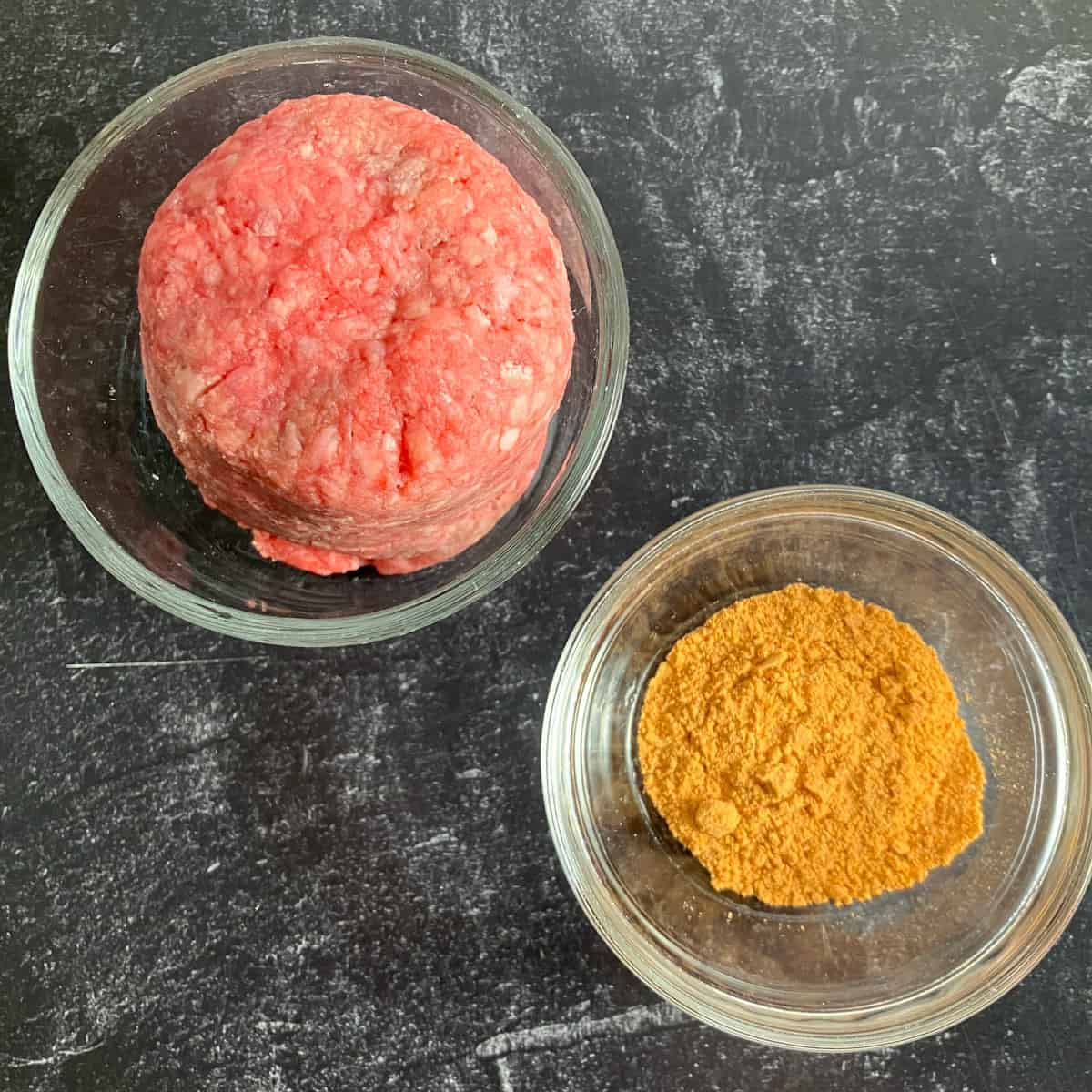
Get a printable recipe card at the end of the post. You can also make this recipe with ground turkey or ground chicken if you don’t eat beef.
I make my own taco seasoning with chili powder, cumin, paprika, garlic powder, onion powder, salt, and pepper. It’s a good way to control the sodium if you are on a low-sodium diet. (It’s also tastier to make your own, but that’s just IMHO.)
You can make ground beef in an air fryer in a Ninja Foodi, Cosori, Pampered Chef Air Fryer, Actifry, Nuwave, Instant Vortex, Cuisinart, Philips, Kalorik air fryer oven, Power Air Fryer, or other air fryer. However, you may need to make slight adjustments to the cooking time.
Let’s air fry ground beef! You don’t need to preheat the air fryer for this recipe.
Mix the ground beef with the taco seasoning using clean hands. Crumble the raw ground beef well and spread it in a single layer in the air fryer basket. Put the air fryer tray or basket back in the air fryer (use the top rack for air fryer ovens).
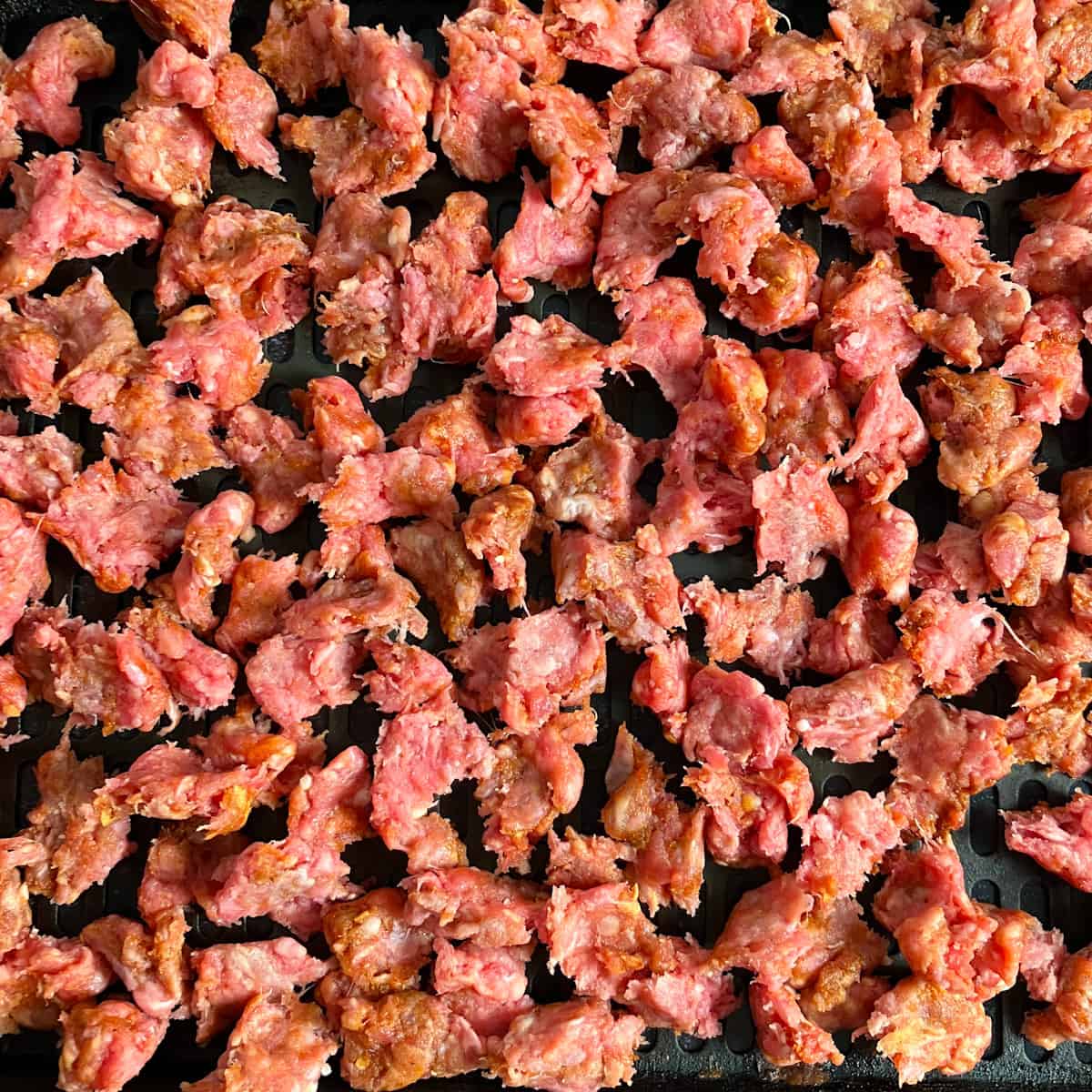
⏲ Ground Beef in Air Fryer Cooking Time and Temperature
How long to cook ground beef in an air fryer? What temp to cook ground beef in air fryer? It took a total of 5 minutes in an air fryer at 375 degrees Fahrenheit (190C) to air fry ground beef.
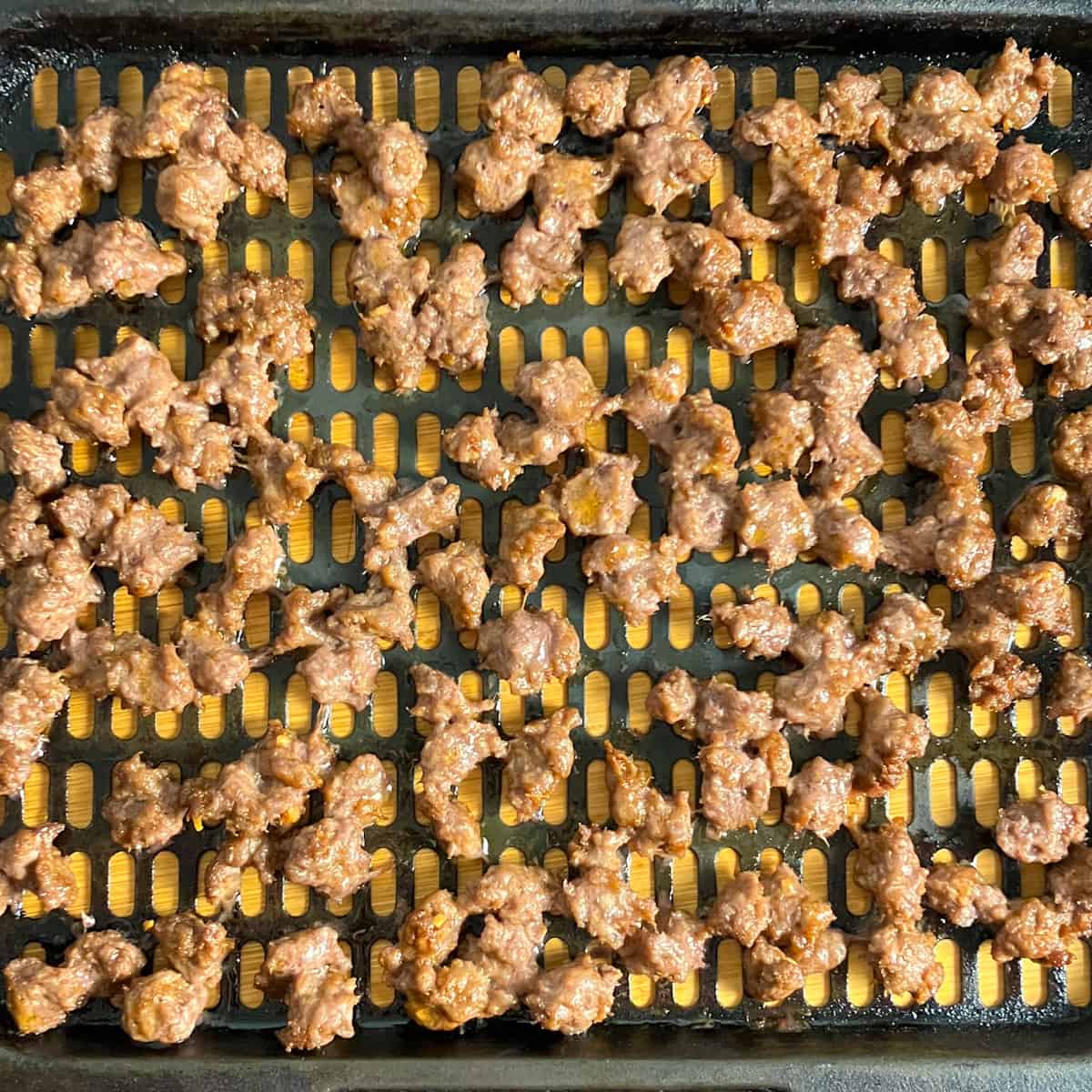
If 5 minutes doesn’t thoroughly brown hamburger meat, chop the beef crumbles up even smaller with a metal spatula (or use clean hands), and put the beef back in the air fryer. Air fry for 1 more minute at 375F (190C).
The safe internal temp for cooked ground beef is 160F (71C). To be honest, I never use a meat thermometer for taco meat, I just make sure it is cooked until well-browned.
Use your air fryer ground beef however you’d like. This recipe is the perfect start to making tacos with your favorite taco toppings. To make taco bowls, follow the directions provided in the recipe card below!
You can keep leftover cooked taco meat in the fridge in an airtight container for 3-4 days. Leftover ground beef also freezes well (vacuum seal it or put it in a freezer bag with the air pressed out). When reheated, it can be used in air fryer tacos, burritos, salads, soups, stews, and casseroles.
FAQs
Can you cook frozen ground beef in an air fryer?
Yes, you can defrost ground beef in an air fryer and cook it. Thaw the ground beef in an air fryer preheated to 350F (175C) for 6 minutes (top rack). Then crumble the beef and follow the directions in this air fryer ground beef recipe. Did you know that you can also cook Frozen Burgers in the Air Fryer?
Can you make taco meat in an Instant Pot?
Yes, you can make Instant Pot taco meat using the “high saute” setting of the Instant Pot. Leave the lid off the Instant Pot during cooking, and follow the stovetop directions for this recipe.
Can you put taco shells in the air fryer?
Yes, you can air fry taco shells. Just like when you put them in the oven, you need to watch them closely so they don’t burn. Try air frying hard taco shells from the store for 3-5 minutes at 350F (175C).
How to season ground beef?
If you don’t like taco seasoning, feel free to season your air fryer ground beef however you’d prefer. Aside from adding herbs and spices, you also could stir in barbecue sauce, salsa, steak sauce, or teriyaki sauce.
Is ground beef healthy?
I would consider ground beef a healthy choice in the sense that it is a nutritious whole food. Ground beef is rich in protein and certain essential vitamins and minerals, such as iron, zinc, and vitamin B12. For those that are looking to lower their intake of saturated fat, extra lean ground beef (96/4) is available.
👩🏻🍳 Other Air Fryer Ground Beef Recipes
Want more healthy ground beef air fryer recipes? Here you go:
📖 Recipe Card
Watch How to Make It!
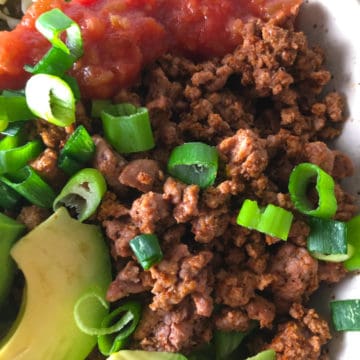
Air Fryer Taco Meat (Ground Beef in Air Fryer Recipe)
Ingredients
- 1 lb. ground beef, lean (454 grams; 90/10 ground beef)
- 5 teaspoons taco seasoning (store-bought or use my homemade mix in the recipe notes)
Instructions
- Mix the ground beef and the taco seasoning using clean hands. Crumble the raw ground beef well and put it in the air fryer basket in a single layer. (Use the top rack for air fryer ovens.)
- Air fry the beef for 5 minutes at 375°F (190°C). If it's not browned enough, chop the beef crumbles up even smaller with a metal spatula (or crumble using clean hands), and put the beef back in the air fryer. Air fry for 1 more minute at 375°F (190°C). To make taco bowls, follow the directions provided in the recipe notes below!
Equipment
Notes
🧂 Homemade Taco Seasoning Ingredients
- 2 teaspoons chili powder
- 1 teaspoon cumin
- 1 teaspoon paprika
- ¼ teaspoon garlic powder
- ¼ teaspoon onion powder
- ¼ teaspoon black pepper
- ¼ teaspoon salt
💭 Expert Tips from Dietitian Summer Yule
This is a level 1 recipe (may help support fat loss). Air fryer taco beef is a lean beef option to add protein to your meals. If you make the taco bowl salad recipe, you’ll have a light and filling meal that’s under 550 calories. If you have higher energy needs, add whole grain crackers or croutons to your taco salad. You’ll add some additional B vitamins, fiber, and have all of your food groups covered. Alternatively, serve the air fryer taco meat in taco shells, flour tortillas, or corn tortillas with classic taco fixings. Here are some more benefits of making ground beef in the air fryer:- Easy to customize: You can flavor up this air fried ground beef any way you’d like if you don’t want taco meat. Add BBQ seasoning, steak seasoning, liquid smoke, Cajun spice, etc.
- Enjoy beef with no oven: This recipe is great for summer, as you don’t need to heat the house with the oven.
- Lower fat: When you air fry ground beef, fat drips away as it cooks. In a skillet, the beef sits in the fat and isn’t drained off (unless you make the effort to do so).
- Keto, low carb: A serving of air fryer taco meat has less than 1-gram net carb per serving. It’s a great fit for very low carb diets.
- Gluten free: This air fryer ground beef recipe is gluten free as long as you use gluten-free seasoning.
- Nutritious: Beef is a rich natural food source of bioavailable heme iron. It also offers a range of other essential nutrients such as zinc.
- Delicious: This air fryer recipe is an easy way to make a variety of tasty meals. Burritos, tacos, salads, soups, stews, and casseroles all become more delicious with this air fryer beef.
🌮 How to Make Air Fryer Taco Bowls
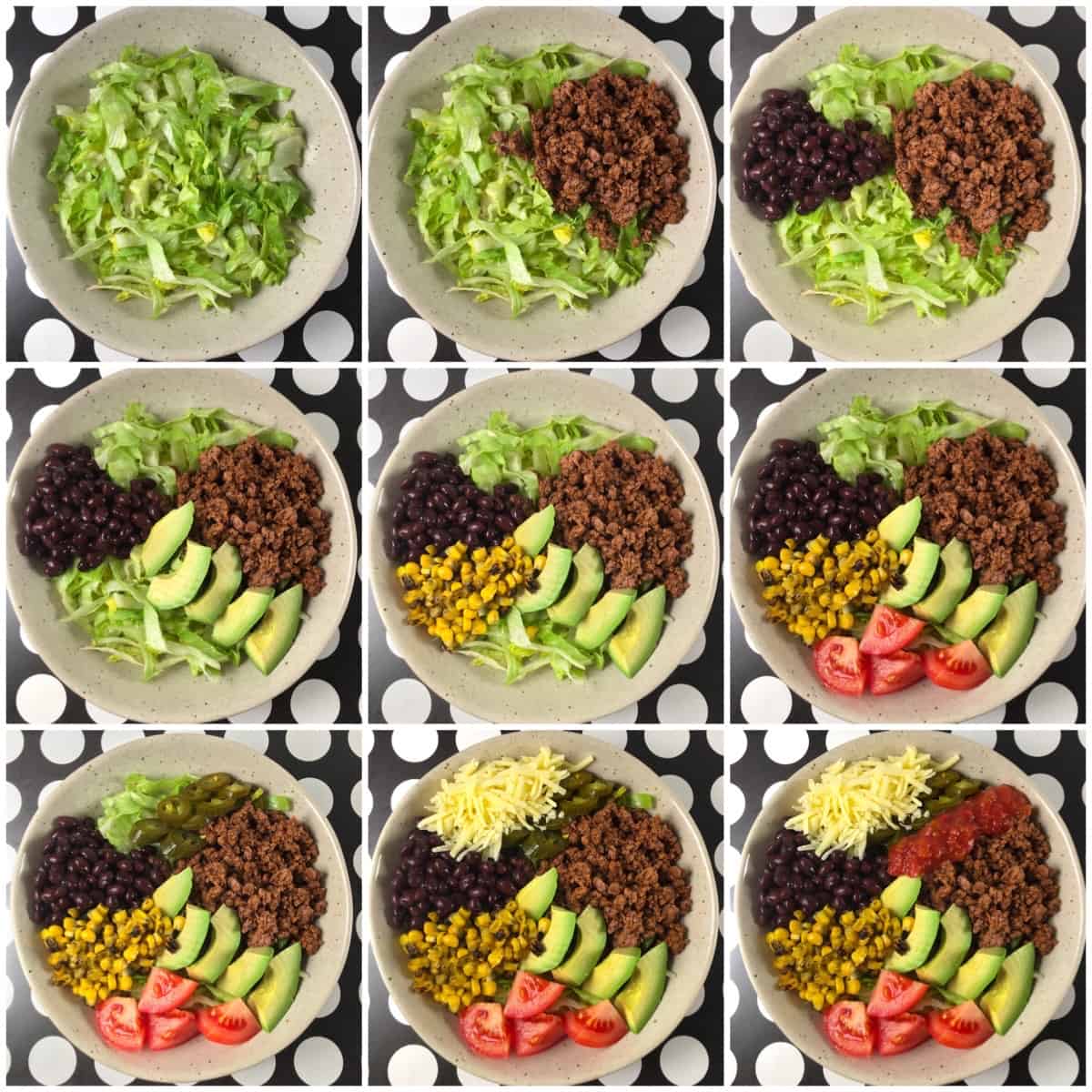 Gather the following ingredients:
Gather the following ingredients:
- 1 prepared recipe Air Fryer Taco Beef
- 1 avocado, chopped
- 1 lime, juiced
- 8 cups iceberg lettuce, chopped
- 3 ounces cheddar, grated (85 grams; about ¾ cup)
- 15½ ounces canned black beans, drained (439 grams)
- 1 tomato, chopped
- 1 cup frozen roasted corn, thawed (I used Trader Joe's brand)
- 2 scallions, sliced
- ⅓ cup sliced pickled jalapeno
- 8 tablespoons salsa
nutrition info disclaimer
All recipes on this website may or may not be appropriate for you, depending on your medical needs and personal preferences. Consult with a registered dietitian or your physician if you need help determining the dietary pattern that may be best for you.
The nutrition information is an estimate provided as a courtesy. It will differ depending on the specific brands and ingredients that you use. Calorie information on food labels may be inaccurate, so please don't sweat the numbers too much.
"To taste" means to your preferences, which may have to be visual to follow food safety rules. Please don't eat undercooked food x
Nutrition
Join our community! Subscribe for all of the latest and greatest recipes, and follow me on Facebook, Pinterest, Instagram, and YouTube!

Hello! I'm Summer, a registered dietitian and home chef who loves to cook, eat, and create high quality content for you! Every recipe on this site has been tested by me to help ensure your success in the kitchen. All eaters are welcome here 🙂


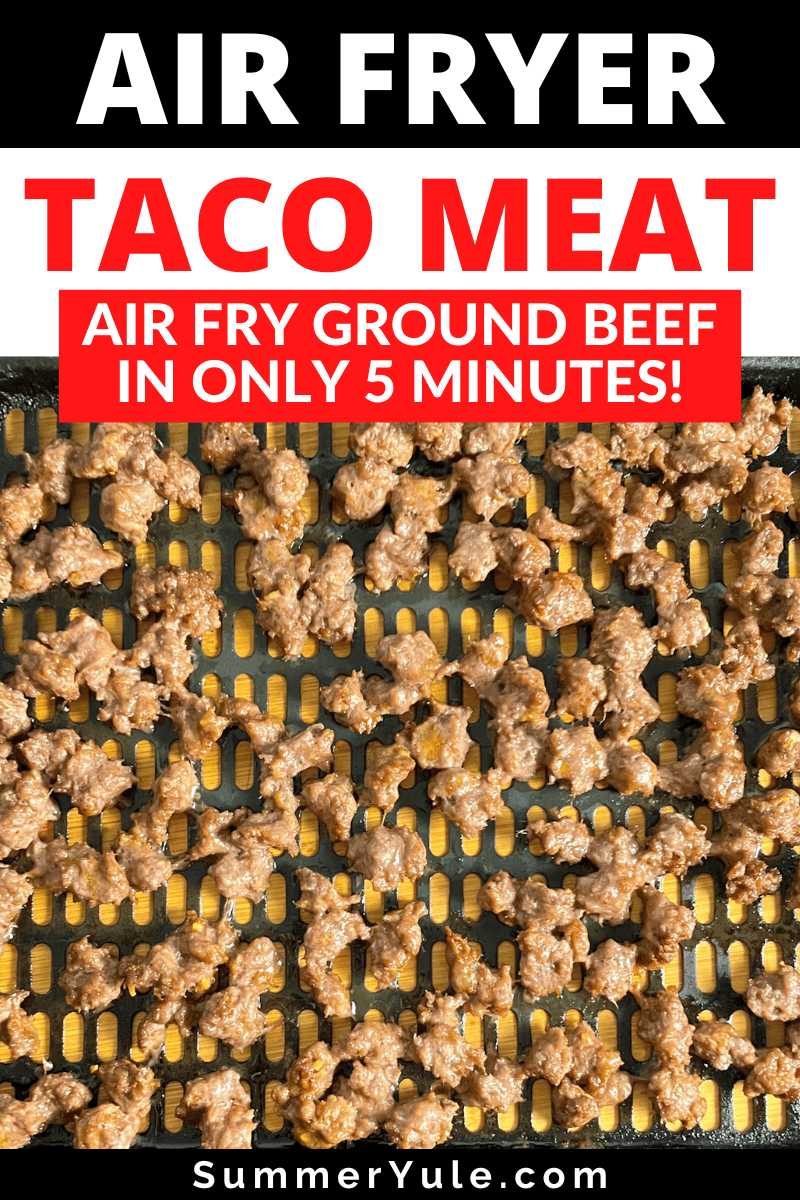
Becky says
Thanks for asking this question. I was also wondering if the spice flavours would fully develop if they weren’t cooked with the meat.
Summer Yule says
Hi Becky, we thought it was absolutely fine adding the spices after, and that they unfortunately tended to taste a little burnt when we tested air frying them with the meat. That said, you could always try it and see if you like it better that way. IMHO one of the joys of air frying is getting the chance to experiment and see which rules were made to be broken 🙂
DeniseN says
Thank you for this recipe! I just got a new air fryer and was reading how to batch cook hamburger meat to freeze cooked rather than raw which saves meal time prep and it thaws quicker. That blog only showed how to accomplish this in an instant pot or slow cooker which takes more time. Being new to air frying I needed time/temp. Viola! Your complete recipe instructions are awesome!
Summer Yule says
Hi Denise, thank you so much for your kind words! I'm so happy this post helped you out- you completely made my morning! 😀